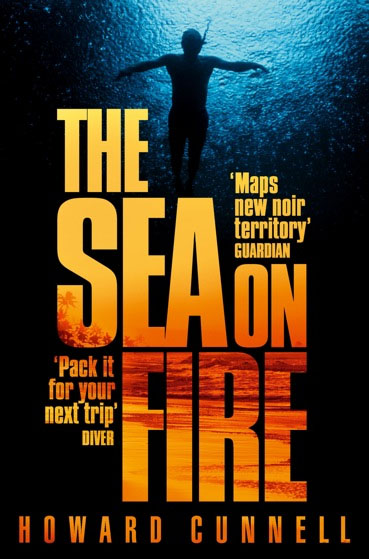The second novel by former diving instructor Howard Cunnell, The Sea on Fire, tells the story of a dive trip to the Red Sea’s Brothers Islands gone horribly awry. His first, Marine Boy, also featured troubled protagonist Kim, an English diving instructor looking for his place in life. Troubled by his traumatic past, he’s spent most of his life underwater. Now a married man with children, he’s struggling to balance his commitments to his family with his longing for the sea.

When his old diving buddy Garland looks him up in London and pitches the chance to lead a three-week trip to Brothers Islands, Kim jumps at the chance. Things quickly go south, as the boat belongs to London gangster Teddy, who has brought an unsavory group of guests along. The trip descends into madness, spurred on by old demons, drugs and the unstable personalities onboard.
Though it’s an enjoyable read, Sea on Fire lacks structure, and Cunnell merely touches on central themes — like Kim and Garland’s relationship — that would have benefited from more in-depth treatment. Garland’s Zen-environmentalist personality is the yin to Kim’s yang, but the character lacks depth, making Garland come off as a cliché, with his sun-bleached hair and sunrise yoga regimen.
The novel also paints a very bleak picture of Red Sea live-aboards: the reefs are ruined, save a precious few; the marinas are dirty; the tour operators irresponsible and driven by nothing but greed; everyone is on drugs. To be fair, this is a noir-style novel, and just as Los Angeles is nothing but corrupt, polluted and violent in Elmore Leonard’s works, so too are the negative aspects of the Red Sea diving industry exaggerated here. As a former diving instructor, perhaps Cunnell has inside knowledge of the industry, but as an experienced Red Sea traveler, I have to say that I must have been on the wrong boats (or rather, the right ones) compared to Cunnell.
The book also references the 1991 film Point Break extensively, and this may be its main weakness: It reads at times as a remake of the film, with diving substituting for surfing. In the novel’s universe, divers are lonesome seekers, traveling the world in search of endless summer and pristine reefs, but bring with them the destruction of the very thing they love, as all reefs are inevitably destroyed once the masses follow the pioneers. While this phenomenon has been seen around the world, again, the description comes off as quite bleak. Cunnell seems, at least to some extent, to agree with Garland, who says “most people have no business being in the water in the first place.”
Weaknesses aside, the author’s seemingly first-hand experience of Red Sea diving does make his description of the boats and the surrounding area — down to the most popular beer and the taste of the coffee onboard — very vivid. And as a noir novel, the negative exaggerations are quite entertaining. So if you’re looking for dive-themed book for your next off-season, or to bring with you on your next dive trip, Sea on Fire will keep you entertained.

